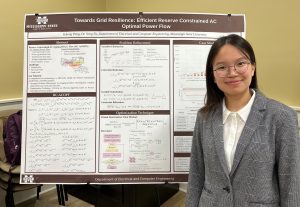Winner of 2023-24 ECE Research Symposium Announced
October 20, 2023
The Department of Electrical and Computer Engineering recently announced the winner of its 2023-24 ECE Research Symposium.
ECE graduate student Yehong Peng won for her presentation “Efficient Reserve Constrained AC Optimal Power Flow.”
Peng said the event supported her long-term goals, providing an opportunity to present her research and obtain constructive feedback from other researchers and experts, as well as broadening her academic perspectives.
She said, “My intent was not just to share the results of my research, but also to provide insight into the entire research journey. It includes the challenges we faced, the process we underwent, and the solutions we derived. I hoped that my findings could initiate further discussions and possibly inspire other researchers, especially considering the widespread relevance of optimization problems across diverse fields.”
Peng’s major professor is Dr. Yong Fu, and Peng recognized the importance of her advisor through the process.
“My advisor has been a cornerstone in my research journey, offering invaluable guidance, assisting in refining my hypotheses, and extending essential resources for deeper exploration. His feedback and professional experience have been a guiding light,” Peng noted.
Peng was one of thirteen participants in the ECE Research Symposium. The event was judged by ECE faculty members Drs. Jenny Du, Ali Gurbuz, Chun-Hung Liu and Masoud Karimi.
The full list of presentations included the following:
- Enhancing Velocity Control: Integrating Attention Mechanism and Deep Deterministic Policy Gradient (DDPG) for Optimizing Safety and Comfort
Authors: Fahmida Islam and John Ball
- CV-SincNet: Learning Complex Sinc Filters from Raw Radar Data for Computationally Efficient Human Motion Recognition
Authors: Sabyasachi Biswas, Cemre Omer Ayna, Sevgi Z. Gurbuz, and Ali Gurbuz
- Task-Specific Hyperspectral Band Selection with Machine Learning
Authors: Cemre Omer Ayna, Mdrafi Robiulhossein, Ali Gurbuz, and Qian Du
- Reliability and Economic Analysis of Hybrid Power Plant Operation
Authors: Yangxin Deng and Xin Fang
- Transmission-and-Distribution Dynamic Co-Simulation for Distributed Automatic Generation Control
Authors: Prasant Basnet and Xin Fang
- Towards Grid Resilience: Efficient Reserve Constrained AC Optimal Power Flow
Authors: Yehong Peng and Yong Fu
- Proactive Planning of DG Locations and Sizes Considering Natural Disasters in Grid-Connected
Authors: Fasiha Zainab and Yong Fu
- Intelligent Residential Demand Response: Achieving Resilient Voltage Management with Consumer Preference
Authors: Komal Naz and Yong Fu
- Optimized Phased Array Beamforming System of Planar Aperiodic Rotated Dipole Antenna Array Using Genetic Algorithm
Authors: Bidya Debnath and Junming Diao
- Environment-Aware Dynamic Partitioning of Deep Neural Networks
Authors: Nitish Patil and Yu Luo
- Graph-based Path Planning for Autonomous Vehicles with Obstacle Fusion
Authors: Timothy Sellers and Chaomin Luo
- Multi-robot Navigation using Improved RRT* with Digital Twin Technology
Authors: Elijah Riser and Chaomin Luo
- Evaluating Graph-based Multi-Waypoint Optimization with Node Selection
Authors: Huston Rogers and Chaomin Luo
The Department of Electrical and Computer Engineering at Mississippi State University consists of 27 faculty members (including seven endowed professors), seven professional staff, and over 700 undergraduate and graduate students, with approximately 100 being at the Ph.D. level. With a research expenditure of over $14.24 million, the department houses the largest High Voltage Laboratory among North American universities.
